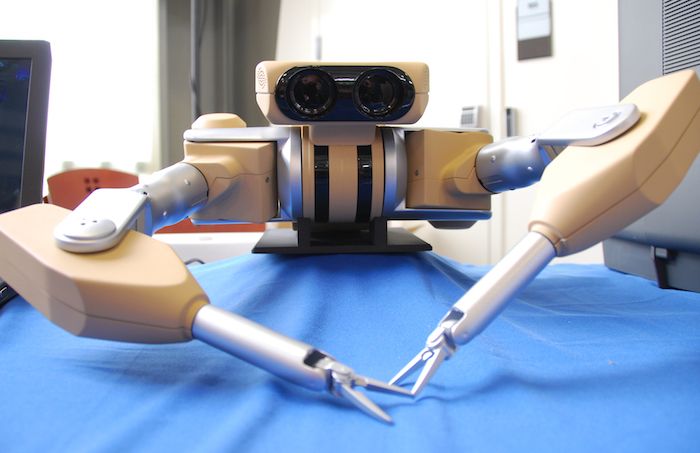Google and Johnson & Johnson Conjugate to Create Verb Surgical, Promise Fancy Medical Robots
From IEEE Spectrum:

This week, Google’s Verily (formerly Google Life Sciences) and Ethicon, a Johnson & Johnson medical device company, announced the formation of a startup called Verb. What is Verb? Something about medical robotics, I guess:
“In the coming years, Verb aims to develop a comprehensive
surgical solutions platform that will incorporate leading-edge robotic
capabilities and best-in-class medical device technology for operating
room professionals.”
Sounds good to me! But seriously, that’s not much to go
on, so let’s see what we can piece together from the press releases put
out from the various companies involved.
The picture at the top of this article almost definitely isn’t Verb’s new surgical robot. It’s Taurus, from SRI Robotics, which (according to a press release) “is
licensing next-generation robotics technology to Verb Surgical that we
believe will impact both the open and minimally invasive surgery markets
and ultimately make the benefits of robotic surgery accessible to more
patients around the world.”
While Taurus, originally designed as a bomb-disposal
robot, is very much not a surgical robot in its current implementation,
it represents several technologies that are very valuable in a surgical
context: highly dexterous small manipulators and an advanced
teleoperation system with haptic feedback.
The SRI press release also says that “Verb
Surgical is developing a new robotic surgery platform that will
integrate technologies such as advanced imaging, data analysis, and
machine learning to enable greater efficiency and improved outcomes
across a wide range of surgical procedures,” which is
interesting because of the reference to machine learning. Machine
learning can be applied to all sorts of things, of course, but existing
commercial surgical robots have mostly steered far away from any kind of
learning behaviors or anything that is in the least bit autonomous. If
the technology can be made reliable enough, it would be an enormous
advance if surgical robots could collaboratively lend their intelligence
to human-controlled surgery.
This is true for the same reason that autonomous cars are
better drivers than humans are: they have the potential to digest
enormous amounts of data (including types that humans can’t directly
access) and rapidly make highly informed decisions. We’re not suggesting
that purely robotic surgeons are the way to go anytime soon, but as
intelligent tools, they could be invaluable....MORE
